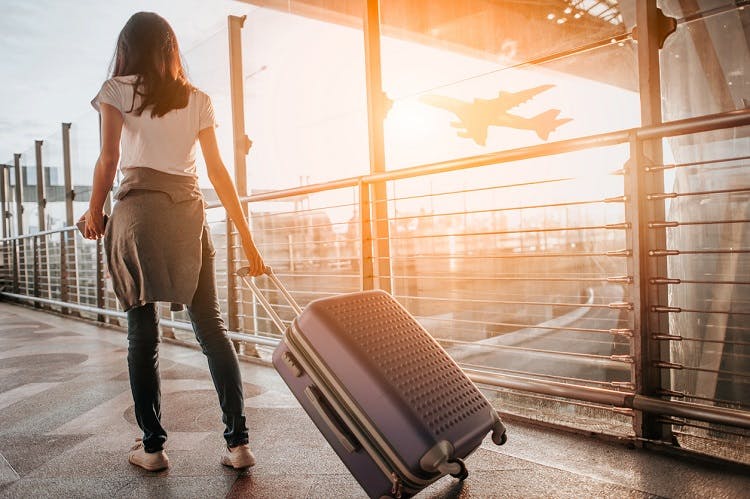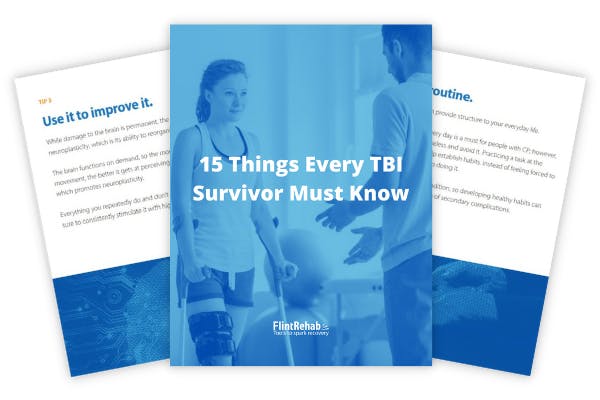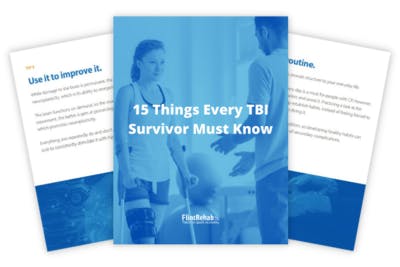No products in the cart.
No products in the cart.
No products in the cart.
No products in the cart.
Home » Neurological Recovery Blog » Traumatic Brain Injury » Flying After Brain Injury: Tips & Guidelines for Safe Travel
Last updated on March 3, 2022

Air travel has allowed people to journey long distances and stay connected to loved ones in far away places. Individuals that have sustained a brain injury may wonder when they can fly again and what safety precautions to consider before flying.
In this article we’ll discuss the risks associated with flying after brain injury and what you can do to ensure your safety. It is crucial to consult with your doctor and get clearance from them before making any travel plans.
In order to understand the risks associated with flying after brain injury, it helps to understand what happens to the body while flying.
Air travel requires flying at a high altitude. However, the human body cannot withstand such high altitudes, so airplanes have built-in pressurized chambers to keep the body in a balanced atmospheric pressure.
When the body is submerged in a lower atmospheric pressure (such as in high altitude), it can lead to hypobaric hypoxia. This means less oxygen is supplied to the tissues that sustain bodily fluids and the brain. Studies have shown that there is a significant decrease in an individual’s partial pressure and oxygen when flying, which is of particular concern after a brain injury.
When pressure changes lead to decreased oxygen in a brain injury survivor, it can alter or worsen the effects of the brain injury. Some of the effects of a brain injury may include headaches, dizziness, fatigue, and difficulty with memory or concentration.
Brain injury can also cause difficulties with processing stimuli such as lights, sounds, crowds, announcements, and instructions, which are frequently encountered during a flight and airport experience.
Most experts believe flying after a brain injury is relatively safe. While there is no exact time frame to wait for all survivors, it is highly recommended to wait until acute symptoms have subsided.
Additionally, many airlines require a formal medical exemption from your primary care provider, or specialist, if the injury occurred within ten days from the flight time. Thus, we recommend waiting at least four weeks before flying and to check with and obtain clearance from your doctor.
Though each case is different for everyone, if you’re currently experiencing swelling, headaches or any other issues, it is highly recommended to wait on travel.
Survivors may notice their symptoms worsen after flying, making it an uncomfortable experience. Therefore, it’s imperative to consult with your doctor to obtain a list of precautions before making travel arrangements.
If your symptoms have subsided and your doctor has given you clearance, you are one step closer to flying. Now it’s time to prepare all necessities to help ensure you have a smooth and safe travel experience. Here are some tips to help you get there.
Make sure your first flight after your brain injury is a short one. Long-haul flights are usually those greater than 6 hours, whereas short flights are 3 hours or less. With shorter flights you’ll shorten your exposure to changes in altitude, which helps lessen the chances of triggering any new or recurring symptoms.
Though it’d be best to start with short flights, medium-long haul flights can be considered if necessary and your doctor approves.

Planning and navigating through airports and keeping track of all your belongings can take a great amount of energy, as well as cognitive thinking. Because cognitive functions are often affected by brain injury, you can avoid becoming overwhelmed by choosing to traveling with a companion.
Having a trusted family member or friend take over travel documentation, or any other tasks necessary, will help ease your load. The less things to worry about, the less likely you are to experience fatigue or exhaustion or other symptoms.
It’s important to avoid traveling alone as much as possible after a brain injury. If you must travel by yourself, however, there are services provided by the airlines to assist travelers. Be sure to contact your airline and inquire about passenger assistance programs.
In addition, the airport has escort services who can provide wheelchair escorts and various carts to help you get to your gate. Be sure to contact the airport as each airport has a different system to assist travelers.
After a brain injury, the brain requires even more energy to sustain itself than before. This means keeping your body well-fed and hydrated is a must.
However, airlines may or may not offer snacks on the plane, so it’s best to not rely on them and pack your own. Snacks like fruits, nuts, and protein bars are great energy providers.
It is very easy to become dehydrated when traveling. Be sure to keep a water bottle with you that you can fill up at the many filling stations after you have crossed through the security.
Drinking water and maintaining balanced meals will reduce the chances of headaches, fatigue, and irritability.

Survivors can become sensitive to sensory stimuli after a brain injury, which can become even more problematic when flying. For instance, airplanes are enclosed spaces that can hold a large number of passengers, making it crowded and noisy.
A few ways to reduce sensory overload includes wearing dark glasses, earplugs, or noise-canceling headphones with soothing music. Dark glasses can help reduce straining the eyes from the overly bright lights, and earplugs can help cancel out the excessive commotion.
To help you feel even more comfortable flying after brain injury, you can talk to the airline about accommodations, too. The Air Carrier Access Act (ACAA) serves to protect individuals with special needs or disabilities when traveling. Under this act, airlines are required to assist and accommodate the needs of their passengers.
As a survivor, for example, you can request preferential seating either on the aisle or closer to the front, whichever you prefer. Different airlines may offer more advantages like being the first to board or exit from the airplane.
Be sure to read the rules and regulations from your airline and request accommodations at least 48 hours before boarding your flight.
Flying with a recent brain injury, even a mild one like a concussion, can be potentially dangerous. One of the main concerns with a concussion is the development of a brain hemorrhage.
As we noted earlier, the change in altitude, or atmospheric pressure, could worsen symptoms. Therefore, flying at a high altitude with intracranial bleeding should be avoided at all costs.
DO NOT fly with a concussion until you have been scanned and cleared for intracranial hemorrhages.
If you believe you bruised your head or have a concussion and are showing symptoms, you must consult with your doctor before flying. (S)he can make sure no brain bleeds are detected.
In general, flying after brain injury is safe, as long as the brain has had enough time to heal and your symptoms are not severe.
How long it takes for the brain to sufficiently heal will vary between persons, but airlines recommend waiting at least ten days after an incident.
Flying after a brain injury can be overwhelming but it doesn’t have to be. The key is to allow enough time for your brain to heal and your symptoms to subside. Avoiding any triggers will also help ease your traveling experience.
Be sure to take the proper precautions and consult with your doctor or specialist beforehand. Safe travels!

If you like our content, you’ll love our ebook and newsletters! Get instant access to our TBI recovery tips ebook with 20 pages of helpful advice by signing up below.
You’ll also receive our emails that share survivor stories and more useful TBI recovery tips, which you can opt out of at any time. (We know you’ll love them, too.)
We will never sell your email address, and we never spam. That we promise.


Time with a speech therapist is extremely valuable during recovery, especially if you struggle with communication, critical thinking, or memory after brain injury. Insurance typically covers speech therapy for a fixed amount of time. But once it’s over, recovery is in your hands.
That’s why a team of neuroscientists and clinicians from Boston University created the CT Speech & Cognitive Therapy app. Designed for those recovering from stroke, TBI, or living with neurological conditions, the app contains over 100,000 cognitive exercises that are all available right from your phone or tablet. That’s like having a speech therapist by your side whenever you want!
This app is the perfect fit if you want to improve your speaking, memory, or general mental sharpness. And, it’s affordable at just $29.99/month!
“For the past 6 months, my son has used the app about three times a week. The app is like a virtual therapist, it’s very easy to use, and it gives him immediate feedback.
He now understands things faster, can make decisions with less hesitation, has improved recognition of words, and his confidence is higher. I also find it easy to get in touch with customer service; they pleasantly help out. The whole experience has been great.”
— Miriam
With the CT App, you can get the guidance you need right from your phone or tablet. You can use it on your own or in between sessions with your speech therapist.
Whether you struggle with aphasia, memory loss, or critical thinking, the CT Speech & Cognitive Therapy App can help.
“The CT app has helped me gather my confidence by building on and reinforcing old forgotten skills. It helps to see my percentages increase, and work harder when they decrease. It’s very self-motivating.” -Kathryn
We are confident that this app will help improve your speech and cognitive function after brain injury. Like our recovery tools, the CT App is also covered by our 30-day money-back guarantee.

Do you know these 15 TBI recovery tips?
Get a free copy of our ebook 15 Things Every TBI Survivor Must Know. Click here to get instant access.
Grab a free rehab exercise ebook!
Sign up to receive a free PDF ebook with recovery exercises for stroke, traumatic brain injury, or spinal cord injury below: